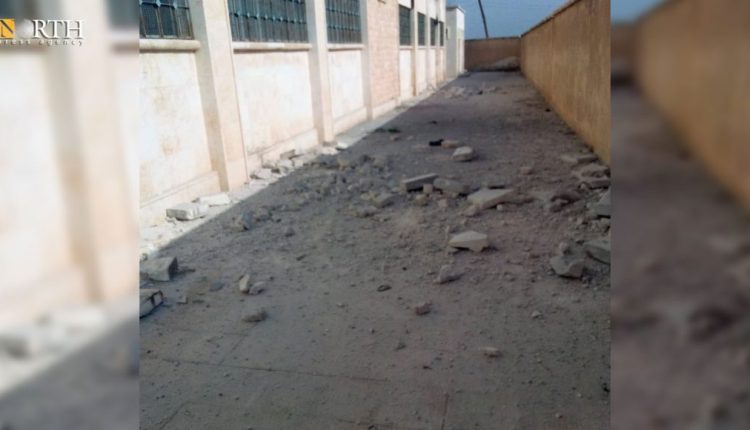
By Fattah Issa
KOBANI, Syria (North Press) – As Turkish-backed shelling continues to devastate northern Syria, thousands of students in Kobani have been forced out of school, with some families resorting to homeschooling.
Parents fear for their children’s safety as unexploded ordnance remains lodged in school buildings, while education officials warn of an escalating crisis affecting over 3,000 students across the region.
Bassam Samou, 43, has been forced to homeschool his five children after their school was targeted by Turkish-backed armed factions, aka the Syrian National Army (SNA).
Since the fall of Bashar al-Assad’s regime in Damascus on Dec. 8, 2024, at least one teacher and eleven students have lost their lives in Kobani due to Turkish-led attacks.
Parents’ fears
Speaking to North Press, Samou said he stopped sending his children to school at the start of the second semester after shell fragments hit the school’s roof, endangering students’ lives. Some of the unexploded ordnance remains on the rooftop, posing an ongoing threat.
Samou and his family live in Tel Abir, a village on the eastern bank of the Euphrates River, west of Kobani. Despite the frequent shelling near his village, he has chosen not to relocate.
His wife has taken on the responsibility of homeschooling their children, though Samou acknowledges it cannot fully replace classroom learning. “Children trust their teachers more than they trust being taught by their parents,” he said.
His five children, Mustafa (1st grade), Noha (2nd grade), Mohammad and Sawsan (4th grade), and Bushra (7th grade), express their longing for school, their teachers, and classmates.
Samou urges relevant authorities and humanitarian organizations to clear the remnants of shells from the school and repair the damage so that his children can return to their studies safely.
He remains reluctant to send them back under current conditions, fearing that unexploded ordnance still present in the school could lead to a tragedy, especially given the high number of students in attendance.
In a previous statement, Kamiran Ebeh, spokesperson for Kobani’s school administration, told North Press that mid-January Turkish shelling targeted the home of teacher Abdullah Sheikh Ali in Tel Abir, killing him and his family.
Ebeh added that Tel Abir’s school, located 35 km west of Kobani, was completely destroyed in the attack, depriving local children of their right to education.
Impact to schools
Shwakh Shwakh, the principal of Tel Abir School, said the institution was hit by three artillery shells on Jan. 9, fired from the western bank of the Euphrates. The attack caused significant structural damage to the building of the school.
According to Shwakh, 500 students in elementary and middle school have been unable to continue their education due to the attack and the deteriorating security situation. Additionally, 24 teachers have been forced to stop working.
He detailed the extent of the damage, stating that two classrooms suffered large holes in their ceilings, the school’s roof had visibly sagged due to shell impact, and rainwater had begun leaking into the building.
Furthermore, the attack shattered 11 classroom windows, destroyed several desks, and damaged doors and walls. Alarmingly, an unexploded heavy artillery shell remains lodged in the ceiling of one of the classrooms.
Meanwhile, Ahmad Suleiman, spokesperson for schools in western rural Kobani, reported that nearly 3,299 students have been deprived of education since the start of the second semester due to Turkish shelling in 14 schools across the region.
Among the affected schools in the villages are two in Jadda Kabira, one in Jadda Saghira, and others in Tel Abir, Quba, Quba Bahira, Turman, Ashma Sharqi, Tel Ahmar, Mazraat Tel Ahmar, Mazraat Quba, and al-Shuyoukh town.
Suleiman also noted that several shells landed near al-Shuyoukh School on Feb. 8.
Schools out of service
In eastern rural Kobani, al-Hurriya village school has been shelled multiple times, rendering it completely non-operational and depriving children from surrounding villages of an education.
Joman Mohammad Issa, the co-chair of Tel Abyad’s school administration, stated that the school had to be shut down due to the repeated shelling, leaving 60 students without access to education.
Issa further warned that several other schools along the frontlines are frequently targeted, leading to student dropouts as parents fear for their children’s safety.
Temporarily closed schools include those in Jadida Ain Issa, al-Fatisa, Jadida Na’im, Nahit, Aheimar, Zanar Kabir, Bir Arab, al-Ahmadiya, Laqlqo, Kork, and Zanar Saghir.
As a result, approximately 560 students have been forced to discontinue their studies.
Issa called on international organizations, human rights groups, child protection agencies, and the U.S.-led Global Coalition to pressure Turkey to cease its attacks on the region.
Villages and towns across western and southern Kobani continue to be subjected to indiscriminate artillery shelling by SNA factions, along with drone strikes targeting areas near Qara Qozaq Bridge and Tishrin Dam on a daily basis.
